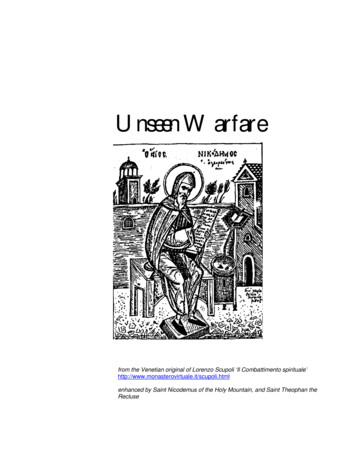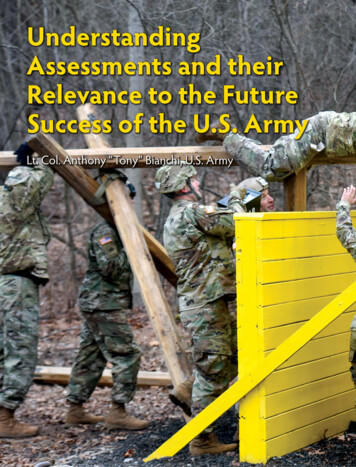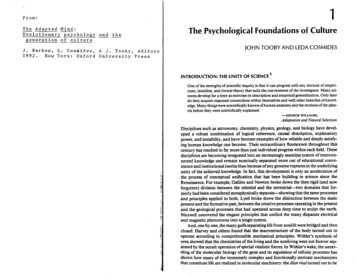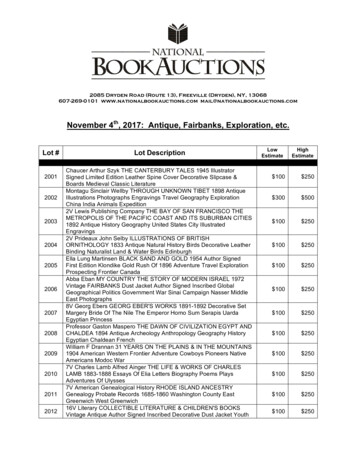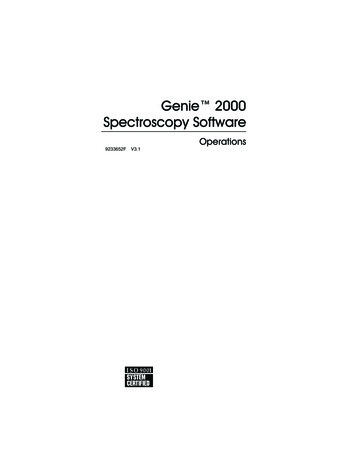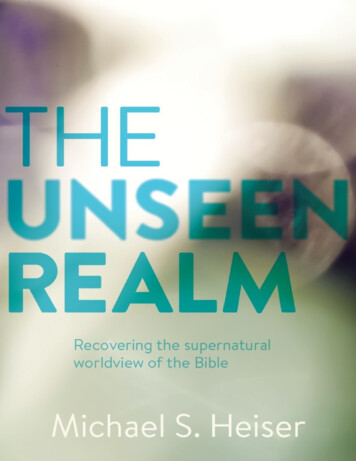
Transcription
THE UNSEEN REALMRecovering the supernatural worldview of the BibleMichael S. Heiser
The Unseen RealmCopyright 2015 by Michael S. HeiserLexham Press, 1313 Commercial St., Bellingham, WA 98225LexhamPress.comAll rights reserved. You may use brief quotations from this resource in presentations, articles, andbooks. Otherwise, no part of this publication may be reproduced, stored in a retrieval system, ortransmitted in any form or by any means—electronic, mechanical, photocopy, recording, scanning, orany other—without thepriorpermission of Lexham Press.Emailusatpermissions@lexhampress.com.Unless otherwise noted, Scripture quotations are from the Lexham English Bible (LEB), copyright2013 by Lexham Press. Lexham is a registered trademark of Faithlife Corporation.Scripture quotations marked ESV are taken from The Holy Bible, English Standard Version, copyright 2001 by Good News Publishers. Used by permission. All rights reserved.Scripture quotations marked as KJV are taken from The Holy Bible, King James Version.Scripture quotations marked NASB are taken from the New American Standard Bible. Copyright 1960, 1962, 1963, 1968, 1971, 1972, 1973, 1975, 1977, 1995 by The Lockman Foundation. Used bypermission.Scripture quotations marked as NRSV are taken from the New Revised Standard Version of the Bible ,copyright 1989 by the Division of Christian Education of the National Council of Churches ofChrist in the United States of America, and are used by permission. All rights reserved.In Scripture quotations, emphasis in boldface was added by the author and was not part of the originaltranslation.Transliteration of words from biblical Hebrew and Greek, along with other ancient languages, hasbeen simplified for English-only readers. More precise transliteration is used only when required bythe discussion.Unless otherwise noted, all maps, illustrations, and photos are provided by Lexham Press.ISBN 978-1-57-799556-2Editor: David LambertCover Design: Andy MeyerFirst Edition
To RogerSomeday when the Lord sits me down to have a talk about this,I’m going to remind him that you started it.
Contents1: FIRST THINGS1 Reading Your Bible Again—for the First Time2 Rules of EngagementPART2: THE HOUSEHOLDS OF GODGod’s EntourageGod AloneAs in Heaven, So on EarthGardens and MountainsEden—Like No Place on EarthOnly God Is PerfectPeril and ProvidenceSection SummaryPART34567893: DIVINE TRANSGRESSIONSTrouble in ParadiseLike the Most High?Divine TransgressionThe Bad SeedDivine AllotmentCosmic GeographySection SummaryPART1011121314154: YAHWEH AND HIS PORTIONAbraham’s WordYahweh Visible and InvisibleWhat’s in a Name?Who Is like Yahweh?Retooling the TemplateGod’s Law, God’s CouncilRealm DistinctionSection SummaryPART161718192021225: CONQUEST AND FAILURE23 Giant Problems24 The Place of the SerpentPART
25 Holy WarSection Summary6: THUS SAYS THE LORDMountains and ValleysStanding in the CouncilDivine MisdirectionThe Rider of the CloudsPrepare to DieSection SummaryPART26272829307: THE KINGDOM ALREADYWho Will Go for Us?Preeminent DomainA Beneficial DeathInfiltrationSons of God, Seed of AbrahamPART313233343536 Lower Than the Elohim37 This Means War38 Choosing SidesSection Summary8: THE KINGDOM NOT YETFinal VerdictFoe from the NorthThe Mount of AssemblyDescribing the bject IndexScripture Index
PART 1FIRST THINGS
CHAPTER 1Reading Your Bible Again—for the First TimeWE ALL HAVE WATERSHED MOMENTS IN LIFE, CRITICAL TURNING POINTSwhere, from that moment on,nothing will ever be the same.One such moment in my own life—the catalyst behind this book—came on a Sunday morning inchurch while I was in graduate school. I was chatting with a friend who, like me, was working on aPhD in Hebrew studies, killing a few minutes before the service started. I don’t recall much of theconversation, though I’m sure it was something about Old Testament theology. But I’ll never forgethow it ended. My friend handed me his Hebrew Bible, open to Psalm 82. He said simply, “Here, readthat look at it closely.”The first verse hit me like a bolt of lightning:God [elohim] stands in the divine assembly;he administers judgment in the midst of the gods [elohim].1I’ve indicated the Hebrew wording that caught my eye and put my heart in my throat. The wordelohim occurs twice in this short verse. Other than the covenant name, Yahweh, it’s the most commonword in the Old Testament for God. And the first use of the word in this verse worked fine. But sinceI knew my Hebrew grammar, I saw immediately that the second instance needed to be translated asplural. There it was, plain as day: The God of the Old Testament was part of an assembly—apantheon—of other gods.Needless to say, I didn’t hear a word of the sermon. My mind was reeling.How was it possible that I’d never seen that before? I’d read through the Bible seven or eighttimes. I’d been to seminary. I’d studied Hebrew. I’d taught for five years at a Bible college.What did this do to my theology? I’d always thought—and had taught my students—that any other“gods” referenced in the Bible were just idols. As easy and comfortable as that explanation was, itdidn’t make sense here. The God of Israel isn’t part of a group of idols. But I couldn’t picture himrunning around with other real gods, either. This was the Bible, not Greek mythology. But there it wasin black and white. The text had me by the throat, and I couldn’t shake free.I immediately set to work trying to find answers. I soon discovered that the ground I wasexploring was a place where evangelicals had feared to tread. The explanations I found fromevangelical scholars were disturbingly weak, mostly maintaining that the gods (elohim) in the versewere just men—Jewish elders—or that the verse was about the Trinity. I knew neither of those couldbe correct. Psalm 82 states that the gods were being condemned as corrupt in their administration ofthe nations of the earth. The Bible nowhere teaches that God appointed a council of Jewish elders torule over foreign nations, and God certainly wouldn’t be railing against the rest of the Trinity, Jesusand the Spirit, for being corrupt. Frankly, the answers just weren’t honest with the straightforwardwords in the text of Psalm 82.When I looked beyond the world of evangelical scholarship, I discovered that other scholars had
churned out dozens of articles and books on Psalm 82 and Israelite religion. They’d left no stoneunturned in ferreting out parallels between the psalm and its ideas and the literature of othercivilizations of the biblical world—in some cases, matching the psalm’s phrases word for word.Their research brought to light other biblical passages that echoed the content of Psalm 82. I came torealize that most of what I’d been taught about the unseen world in Bible college and seminary hadbeen filtered by English translations or derived from sources like Milton’s Paradise Lost.That Sunday morning and its fallout forced a decision. My conscience wouldn’t let me ignore myown Bible in order to retain the theology with which I was comfortable. Was my loyalty to the text orto Christian tradition? Did I really have to choose between the two? I wasn’t sure, but I knew thatwhat I was reading in Psalm 82, taken at face value, simply didn’t fit the theological patterns I hadalways been taught. And yet there had to be answers. After all, the passages I had only now noticedhad also been read by apostles like Paul—and by Jesus himself, for that matter. If I couldn’t find helpin finding those answers, I would just have to put the pieces together myself.That journey has taken fifteen years, and it has led to this book. The path has not been easy. Itcame with risk and discomfort. Friends, pastors, and colleagues at times misunderstood my questionsand my rebuttals of their proposed answers. Conversations didn’t always end well. That sort of thinghappens when you demand that creeds and traditions get in line behind the biblical text.Clarity eventually prevailed. Psalm 82 became a focal point of my doctoral dissertation, whichalso examined the nature of Israelite monotheism and how the biblical writers really thought about theunseen spiritual realm. I wish I could say that I was just smart enough to figure things out on my own.But in reality, even though I believe I was providentially prepared for the academic task I faced, therewere times in the process when the best description I can give is that I was led to answers.I still believe in the uniqueness of the God of the Bible. I still embrace the deity of Christ. But ifwe’re being honest when we affirm inspiration, then how we talk about those and other doctrinesmust take into account the biblical text.What you’ll read in this book won’t overturn the important applecarts of Christian doctrine, butyou’ll come across plenty of mind grenades. Have no fear—it will be a fascinating, faith-buildingexercise. What you’ll learn is that a theology of the unseen world that derives exclusively from thetext understood through the lens of the ancient, premodern worldview of the authors informs everyBible doctrine in significant ways. If it sounds like I’m overpromising, just withhold judgment tillyou’ve read the rest of the book.What you’ll read in this book will change you. You’ll never be able to look at your Bible thesame way again. Hundreds of people who read the early drafts of this book over the past decadehave told me so—and appreciated the experience deeply. I know they’re right because I’m living thatexperience, too.My goal is simple. When you open your Bible, I want you to be able to see it like ancientIsraelites or first-century Jews saw it, to perceive and consider it as they would have. I want theirsupernatural worldview in your head.You might find that experience uncomfortable in places. But it would be dishonest of us to claimthat the biblical writers read and understood the text the way we do as modern people, or intendedmeanings that conform to theological systems created centuries after the text was written. Our contextis not their context.Seeing the Bible through the eyes of an ancient reader requires shedding the filters of our
traditions and presumptions. They processed life in supernatural terms. Today’s Christian processesit by a mixture of creedal statements and modern rationalism. I want to help you recover thesupernatural worldview of the biblical writers—the people who produced the Bible. Obtaining andretaining that ancient mind-set requires observing a few ground rules, which we’ll examine in the nextchapter.
CHAPTER 2Rules of EngagementI’VE ALWAYS BEEN INTERESTED IN ANYTHING OLD AND WEIRD.I WAS GOOD at school, too. When Ibecame a Christian in high school I felt like I’d been born for Bible study. I know—that level ofinterest in the Bible wasn’t normal for a teenager. It was a bit of an obsession. I spent hours studyingthe Bible, as well as theology books. I took commentaries to study hall.Since there was no 12-step program for my addiction, I went to Bible college to feed it. After thatit was off to seminary. I wanted to be a biblical studies professor, so the next step was graduateschool, where I finally focused on the Hebrew Bible and lots of dead ancient languages. I’d foundbiblical nerdvana, at least until that Sunday morning when I saw Psalm 82 without Englishcamouflage.Looking back, I can explain all my study, education, and learning before and after my Psalm 82moment using two metaphors: a filter and a mosaic.FILTERING THE TEXTFilters are used to eliminate things in order to achieve a desired result. When we use them in cooking,the unwanted elements are dredged, strained, and discarded. When used in our cars, they preventparticles from interfering with performance. When we use them in email, they weed out what (orwhom) we don’t want to read. What’s left is what we use—what contributes to our meal, our engine,or our sanity.Most of my education was conducted in this way—using filters. It was no sinister plot. It was justwhat it was. The content I learned was filtered through certain presumptions and traditions thatordered the material for me, that put it into a system that made sense to my modern mind. Verses thatdidn’t quite work with my tradition were “problem passages” that were either filtered out orconsigned to the periphery of unimportance.I understand that a lot of well-meaning Bible students, pastors, and professors don’t look at howthey approach the Bible that way. I know I didn’t. But it’s what happens. We view the Bible throughthe lens of what we know and what’s familiar. Psalm 82 broke my filter. More importantly, it alertedme to the fact that I’d been using one. Our traditions, however honorable, are not intrinsic to theBible. They are systems we invent to organize the Bible. They are artificial. They are filters.Once I’d been awakened to this, it struck me as faithless to use a filter. But throwing away myfilters cost me the systems with which I’d ordered Scripture and doctrine in my mind. I was left withlots of fragments. It didn’t feel like it at the time, but that was the best thing that could have happened.THE MOSAICThe facts of the Bible are just pieces—bits of scattered data. Our tendency is to impose order, and todo that we apply a filter. But we gain a perspective that is both broader and deeper if we allowourselves to see the pieces in their own wider context. We need to see the mosaic created by the
pieces.The Bible is really a theological and literary mosaic. The pattern in a mosaic often isn’t clear upclose. It may appear to be just a random assemblage of pieces. Only when you step back can you seethe wondrous whole. Yes, the individual pieces are essential; without them there would be nomosaic. But the meaning of all the pieces is found in the completed mosaic. And a mosaic isn’timposed on the pieces; it derives from them.I now view Psalm 82 not as a passage that shredded my filter but rather as an important piece of alarger, mesmerizing mosaic. Psalm 82 has at its core the unseen realm and its interaction with thehuman world. And that psalm isn’t the only piece like that; there are lots of them. In fact, theintersection of our domain and the unseen world—which includes the triune God, but also a muchmore numerous cast—is at the heart of biblical theology.My passion is to persuade you to remove your filter and begin to look at the pieces of Scripture aspart of a mosaic so that this “big picture” can begin to take focus. If you do it, you’ll find, as I did,that this approach leads you to the answers to questions like, “Why is that in the Bible?” and “Howcan I make sense of all this?” If you’ve spent serious time in Scripture, you know that there are manyodd passages, curious phrases, troubling paradoxes, echoes of one event in another, connectionswithin and between the testaments that can’t be coincidental.OBSTACLES AND PROTOCOLSThere are some serious obstacles to transitioning from seeing the Bible through filters to allowing allof its pieces to form a mosaic. I’ve experienced all of them.1. We’ve been trained to think that the historyof Christianity is the true context of the BibleWe talk a lot about interpreting the Bible in context, but Christian history is not the context of thebiblical writers. The proper context for interpreting the Bible is not Augustine or any other churchfather. It is not the Catholic Church. It is not the rabbinic movements of late antiquity and the MiddleAges. It is not the Reformation or the Puritans. It is not evangelicalism in any of its flavors. It is notthe modern world at all, or any period of its history.The proper context for interpreting the Bible is the context of the biblical writers—the context thatproduced the Bible.1 Every other context is alien to the biblical writers and, therefore, to the Bible.Yet there is a pervasive tendency in the believing Church to filter the Bible through creeds,confessions, and denominational preferences.I’m not arguing that we should ignore our Christian forefathers. I’m simply saying that we shouldgive their words and their thought the proper perspective and priority. Creeds serve a useful purpose.They distill important, albeit carefully selected, theological ideas. But they are not inspired. They areno substitute for the biblical text.The biblical text was produced by men who lived in the ancient Near East and Mediterraneanbetween the second millennium BC and the first century AD. To understand how biblical writersthought, we need to tap into the intellectual output of that world. A vast amount of that material isavailable to us, thanks to modern technology. As our understanding of the worldview of the biblicalwriters grows, so does our understanding of what they intended to say—and the mosaic of their
thinking takes shape in our minds.2. We’ve been desensitized to the vitality andtheological importance of the unseen worldModern Christianity suffers from two serious shortcomings when it comes to the supernatural world.First, many Christians claim to believe in the supernatural but think (and live) like skeptics. Wefind talk of the supernatural world uncomfortable. This is typical of denominations and evangelicalcongregations outside the charismatic movement—in other words, those from a background like theone I grew up in.There are two basic reasons why noncharismatics tend to close the door on the supernaturalworld. One is their suspicion that charismatic practices are detached from sound exegesis ofScripture. As a biblical scholar, it’s easy for me to agree with that suspicion—but over time it haswidely degenerated into a closed-minded overreaction that is itself detached from the worldview ofthe biblical writers.The other reason is less self-congratulatory. The believing church is bending under the weight ofits own rationalism, a modern worldview that would be foreign to the biblical writers. TraditionalChristian teaching has for centuries kept the unseen world at arm’s length. We believe in the Godheadbecause there’s no point to Christianity without it. The rest of the unseen world is handled with awhisper or a chuckle.The second serious shortcoming is evident within the charismatic movement: the elevation ofexperience over Scripture. While that movement is predisposed to embrace the idea of an animatespiritual world, its conception of that world is framed largely by experience and an idiosyncraticreading of the book of Acts.Those two shortcomings, while seemingly quite different, are actually born of the samefundamental, underlying problem: Modern Christianity’s view of the unseen world isn’t framed by theancient worldview of the biblical writers. One segment wrongly consigns the invisible realm to theperiphery of theological discussion. The other is so busy seeking some interaction with it that it hasbecome unconcerned with its biblical moorings, resulting in a caricature.I’m concerned about both shortcomings, but since this book derives from my own story, theproblem of the Christian skeptic hits closer to home and is my greater concern.If your background, like mine, is in the evangelical, noncharismatic branch of Protestantism,perhaps you consider yourself an exception to the patterns I’ve identified, or think that I’ve overstatedthe situation. But what would you think if a Christian friend confided to you that he believed he hadbeen helped by a guardian angel, or that he had audibly heard a disembodied voice warning him ofsome danger? What if your friend claimed to have witnessed demonic possession, or was convincedthat God had directed her life through a dream that included an appearance of Jesus?Most of us noncharismatics would have to admit that our initial impulse would be to doubt. Butwe actually have a less transparent reflex. We would nod our head and listen politely to our friend’sfervent story, but the whole time we would be seeking other possible explanations. That’s becauseour modern inclination is to insist on evidence. Since we live in a scientific age, we are prone tothink these kinds of experiences are actually emotional misinterpretations of the events—or, worse,something treatable with the right medication. And in any individual case, that might be so—but thetruth is that our modern evangelical subculture has trained us to think that our theology precludes any
experience of the unseen world. Consequently, it isn’t an important part of our theology.My contention is that, if our theology really derives from the biblical text, we must reconsiderour selective supernaturalism and recover a biblical theology of the unseen world. This is not tosuggest that the best interpretation of a passage is always the most supernatural one. But the biblicalwriters and those to whom they wrote were predisposed to supernaturalism. To ignore that outlook ormarginalize it will produce Bible interpretation that reflects our mind-set more than that of thebiblical writers.3. We assume that a lot of things in the Bibleare too odd or peripheral to matterSometime after we moved to Wisconsin for my doctoral work, my wife and I found a church that feltas if it might become our new church home. The pastor had a degree from a well-known seminary.His first two sermons from 1 Peter were filled with solid exposition. I was excited about theprospects. By our third visit, he had reached 1 Peter 3:14–22 in his sermon series, a very oddpassage that’s also one of my favorites. What happened next is etched on my memory. The pastor tookthe pulpit and announced with complete sincerity, “We’re going to skip this section of 1 Peter sinceit’s just too strange.” We didn’t visit again.I’ve seen this sort of evasion more than once. Usually it’s not as dramatic. Pastors don’t typicallytell their people to skip part of the Bible. The more common strategy for “handling” strange passagesis more subtle: Strip the bizarre passage of anything that makes it bizarre. The goal is to provide themost ordinary, comfortable interpretation possible.This strategy is ironic to say the least. Why is it that Christians who would strenuously defend abelief in God or the virgin birth against charges that they are unscientific or irrational don’t hesitate tocall out academic SWAT teams to explain away “weird” biblical passages? The core doctrines of thefaith are themselves neither ordinary nor a comfortable fit with empirical rationalism.The odds are very high that you’ve never heard that Psalm 82 plays a pivotal role in biblicaltheology (including New Testament theology). I’ve been a Christian for over thirty years and I’venever heard a sermon on it. There are many other passages whose content is curious or “doesn’t makesense” and so are abandoned or glossed over. Here’s a sampling of them: Gen 1:26Gen 3:5, 22Gen 6:1–4Gen 10–11Gen 15:1Gen 48:15–16Exod 3:1–14Exod 23:20–23Num 13:32–33Deut 32:8–92Deut 32:17Judg 61 Sam 3
1 Sam 23:1–141 Kgs 22:1–232 Kgs 5:17–19Job 1–2Pss 82, 68, 89Isa 14:12–15Ezek 28:11–19Dan 7Matt 16:13–23John 1:1–14John 10:34–35Rom 8:18–24Rom 15:24, 281 Cor 2:6–131 Cor 5:4–51 Cor 6:31 Cor 10:18–22Gal 3:19Eph 6:10–12Heb 1–21 Pet 3:18–222 Pet 1:3–42 Pet 2:4–5Jude 5–7Rev 2:26–28Rev 3:21Don’t consider that a mere catalog. The list is deliberate, and all of those passages will beexamined in this book. All are conceptually interconnected, and all help illuminate the morecommonly studied passages—those that do “make sense.” Look them up for a glimpse of what we’llbe talking about.How are we supposed to understand the identity of the “sons of God” in Genesis 6:1–4? Why didJesus angrily rebuke Peter by saying “Get behind me, Satan”? Why does Paul tell the Corinthianchurch to stop arguing because they would someday “rule over angels”? There are lots ofexplanations offered by pastors and teachers of the Bible for these and other strange passages, butmost are offered without consideration of how that explanation works with the rest of the Bible, withpassages strange or not-so-strange.In this book, I’ll be offering my take on many “strange passages.” Other scholars have done thesame. But if mine are different, it’s because they grow out of the perspective of the mosaic. Theydon’t exist in isolation from other passages. They have explanatory power in more than one place.My point is not to suggest that we can have absolute certainty in interpretation everywhere in theBible. No one, including the present writer, is always right about what every passage means. I have afirm grasp of my own lack of omniscience. (So does my wife, for the record.) Rather, my contention
in this book is that if it’s weird, it’s important. Every passage plays a coherent role in the mosaicwhole.I’ve said that the mosaic of biblical theology gives coherence to the pieces of the Bible. But the Bibleis a long, detailed work. One of the hardest parts about writing this book was deciding what toreserve for another book—how to be comprehensive without being exhaustive. I decided to cheat.The present book is the culmination of years of my time spent reading and studying the biblicaltext and exploring the insights of other scholars. I’ve accumulated thousands of books and scholarlyjournal articles that relate in some way to the ancient biblical worldview that produces the mosaic.I’ve read nearly all of them in part or whole. My bibliography is nearly as long as this book. Imention this to make it clear that the ideas you’ll read here are not contrived. All of them havesurvived what scholars call peer review. My main contribution is synthesis of the ideas andarticulating a biblical theology not derived from tradition but rather framed exclusively in the contextof the Bible’s own ancient worldview.The present book is academic in tone, but it’s not necessarily a book for scholars. You don’t needto have gone to seminary or earned an advanced degree to follow along. I’ve tried to reservetechnical discussion to a companion website to this book that will provide fuller discussion oncertain topics, additional bibliography, and “nuts and bolts” data from the original languages for thosewho desire that.3For those for whom this book may feel too dense, I’ve written a less-detailed version entitledSupernatural. It covers the core concepts in this book with an orientation toward practicalapplication of the supernatural worldview of the biblical writers—toward how the biblical mosaicpresented here should change our spiritual lives and outlook.The subtitle of this book (“Recovering the Supernatural Worldview of the Bible” ) captures thestruggle of being a modern person with a believing heart trying to think like a premodern biblicalwriter. If you can feel even a little of that conflict, you’re where I’ve been for a very long time. AndI’m still on that journey. Somewhere along the way, I came to believe that I didn’t need protectionfrom my Bible. If you believe that too, you’re good to go.
PART 2THE HOUSEHOLDS OF GOD
CHAPTER 3God’s EntourageCHILDREN OFTEN ASK , “WHAT WAS THERE BEFORE GOD MADE THE WORLD?” The answer most adultswould give is that God was there. That’s true, but incomplete. God had company. And I’m not talkingabout the other members of the Trinity.GOD’S FAMILYThe biblical answer is that the heavenly host was with God before creation. In fact, they witnessed it.What God says to Job in Job 38:4–7 is clear on that point:4 “Wherewere you at my laying the foundation of the earth?Tell me, if you possess understanding.5 Who determined its measurement? Yes, you do know.Or who stretched the measuring line upon it?6 On what were its bases sunk?Or who laid its cornerstone,7 when the morning stars were singing togetherand all the sons of God shouted for joy?When God laid the foundations of the earth, the “sons of God” were there, shouting for joy. But whoare the sons of God? Obviously, they aren’t humans. This is before the creation of the world. Wemight think of them as angels, but that wouldn’t be quite correct.The unseen world has a hierarchy, something reflected in such terms as archangel versus angel.That hierarchy is sometimes difficult for us to discern in the Old Testament, since we aren’taccustomed to viewing the unseen world like a dynastic household (more on that following), as anIsraelite would have processed certain terms used to describe the hierarchy. 1 In the ancient Semiticworld, sons of God (Hebrew: beney elohim) is a phrase used to identify divine beings with higherlevel responsibilities or jurisdictions. The term angel (Hebrew: mal’ak) describes an important butstill lesser task: delivering messages.2In Job 38, the sons of God are referred to as “morning stars.” That same description is foundoutside the Bible in ancient texts from the biblical world. Ancient people thought the stars were livingentities.3 Their reasoning was simple: Many stars moved. That was a sign of life to the ancient mind.Stars were the shining glory of living beings.The stars also inhabited the divine realm—literally, in the sense that they existed off the earth.The ancients believed that divine beings lived far away from humans, in remote places where humanhabitation wasn’t possible. The most remote place of all was the sky, the heavens.Morning stars are the stars one sees over the horizon just before the sun appears in the morning.They signal new life—a new day. The label works. It conveys the right thought. The original morningstars, the sons of God, saw the beginning of life as we know it—the creation of earth.
Right from the start, then, God has company—other divine beings, the sons of God. Mostdiscussions of what’s around before creation omit the members of the heavenly host. That’sunfortunate, because God and the sons of God, the divine family, are the first pieces of the mosaic.We’ve barely made it to creation so far, and already we’ve uncovered some important truths fromScripture that have the potential to affect our theolog
One such moment in my own life—the catalyst behind this book—came on a Sunday morning in church while I was in graduate school. . Yahweh, it’s the most common word in the Old Testament for God. And the first use of the word in this verse worked fine. . in black and white. The text had me by the

